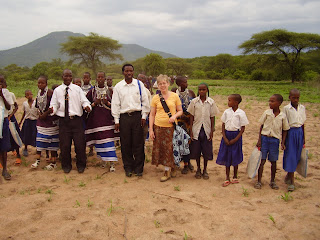Village # 7: Mahove

We punctured a tire driving over the rough ground; the driver fixed the tire while we met and prayed with people from the congregation.
The people of Mahove are Maasai, a nomadic tribe with a fierce pride in their heritage and culture. Traditionally living in Kenya and northern Tanzania, the government has in recent decades been moving them farther south, into the highlands of the Iringa region. It makes for some interesting cultural clashes with the local Hehe and Bene tribes.
Many times, the Maasai are relocated to resource-poor areas. That's the situation at Mahove. There is land for grazing their goats and cattle. But the nearest water is a mile and a half away. the nearest road, the same distance. The nearest primary school is a little farther than that.
In the past decade, a number of Maasai have converted to Christianity--first the women and children, and more recently, some of the men.

During our August 2010 trip, Pastor Randy Brandt had the opportunity to baptize a member of the congregation -- an "mzee" or old man.
 But Mahove has come to the attention of our partnership because of one woman, a Bibi or grandmother who is known as Mama Petro (the name of her oldest son).
But Mahove has come to the attention of our partnership because of one woman, a Bibi or grandmother who is known as Mama Petro (the name of her oldest son).Several years ago, Mama Petro started making monthly treks down the hill from Mahove, several more kilometers cross country, passing through the villages of Makifu, Mahuninga, Makambalala, finally turning the corner and coming into Tungamalenga. She would knock on the door of the church office and ask to speak to the pastor. We need your help, she would say. We need this partnership to bring a chapel to Mahove.
After a couple years, the villagers at Mahove had built a chapel of sticks with a grass roof. Worshippers sat on pews made of split logs perched about six inches off the ground. Then they began to make mud bricks. Mama Petro would visit the church office, telling what the congregation had accomplished and asking for help with the cement and the roofing materials.
The women of the parish sent beaded jewelry with SOTV travelers, who sold the items and sent money back to the parish for cement and roofing materials.
With the chapel construction underway, Mama Petro continued her visits to the church office. We need your help, she would say. We need this partnership to bring water to this village.
Pastor Naftal says she has the persistence of Esther.
Her persistence is effective. Over the past year, the parish has worked up a proposal to pipe water to the village, as was done by a nearby village. They have taken the proposal through the various levels of government. Last month the plan was reviewed by the district water engineer. He will take several technicians to Mahove this month to do a complete site survey, assess the feasibility of the plan, and drill boreholes to determine whether wells would be a better option for the village.
On our side, Shepherd of the Valley is gearing up to raise awareness and funds for the water project at Mahove through our Walk for Water July 16 & 17.
Already, through VBS offerings, the children of Shepherd of the Valley have raised more than $2000 for the water project.
Upon hearing that news, one member of Tungamalenga Parish said, "I was so surprised to hear that children have contributed that amount in one event! May the blessings from the heavenly father be upon them all. It illustrates for us how through Mahove, in a very remote area, God is planning to do his wonderful changes, taking non- and low-respected people, and raise them to the highest point through your hands."
Yes, it is amazing. God lifts up the lowly, God uses the gifts of children, God transforms us all in unexpected ways.



Comments
Post a Comment